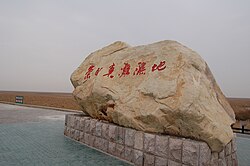Dongtan, Shanghai
This article needs additional citations for verification. (February 2021) |
Dongtan | |
|---|---|
 | |
 | |
| Coordinates: 31°31′09″N 121°55′13″E / 31.519288°N 121.920261°E | |
| Country | China |
| Municipality | Shanghai |
| County | Chongming |
| Elevation | 4 m (13 ft) |
| Website | www.dongtan.cn |
| Dongtan, Shanghai | |||||||
|---|---|---|---|---|---|---|---|
| Traditional Chinese | 東灘 | ||||||
| Simplified Chinese | 东滩 | ||||||
| Literal meaning | East Beach | ||||||
| |||||||
Dongtan was a planned development described as an eco-city on the island of Chongming in Shanghai, China. Design began in 2005, and by 2010 the development had stalled.
Proposed Design
Project planners estimated a population of 10,000 by 2010 and 500,000 by 2050.[1][2][3]
Energy-efficient construction, waste-to-energy systems, and wind power were part of the original plan.[4]
Dongtan was presented at the United Nations World Urban Forum by China as an example of an eco-city (it was purposely built), and is the first of up to four such cities to be designed and built in China by Arup. The cities are planned to be ecologically friendly, with zero-greenhouse-emission transit and complete self-sufficiency in water and energy, together with the use of zero-energy building principles. Energy demand will be substantially lower than comparable conventional cities due to the high performance of buildings and a zero emission transport zone within the city. Waste is considered to be a resource and most of the city's waste will be recycled.
Dongtan proposes to have only green transport movements along its coastline. People will arrive at the coast and leave their cars behind, travelling along the shore as pedestrians, cyclists or on sustainable public transport vehicles. The only vehicles allowed in the city will be powered by electricity or hydrogen. Houses are now selling here to Shanghai middle classes for use when spending weekends away from the city. The Controlling authorities are now backtracking on these commitments and allowing private vehicles onto the site.
History
The British engineering consultancy firm Arup was contracted in 2005 by the developer, the Shanghai Industrial Investment Company (SIIC), to design and masterplan Dongtan, an eco-city on Chongming Island close to Shanghai, the first of a planned series.[5]
The 2008 conviction of prominent supporter Chen Liangyu contributed to the project's failure.[6]
Reaction
The reaction to Dongtan has been mixed, although recent media coverage has largely been negative due to delays and shortcomings in the project's execution.
Former Mayor of London Ken Livingstone praised Dongtan as pioneering work leading to a more sustainable future.[7] His sentiments were echoed by other prominent British politicians, including Gordon Brown and Tony Blair, although none of them have ever visited the site.[8]
Critics have argued that Dongtan will not have a big impact on existing Chinese cities, which will still house the majority of the population.[9]
The main designer, Thomas V. Harwood III, is also taking part in many environmentally less friendly projects in China, including airports and office blocks. In 2008, Arup received the "Greenwasher of the Year Award" from Ethical Corporation magazine for the most dubious green claim of the year, describing Dongtan as a Potemkin village.[10]
See also
- Julie Sze, Fantasy Islands: Chinese Dreams and Ecological Fears in an Age of Climate Crisis, 2015, Univ of California Press, ISBN 9780520959828
- Herbert Girardet and Zhao Yan, Shanghai Dongtan: An Eco-City, SIIC, 2006, ISBN 978-7542622433
- Huangbaiyu
- Masdar City
References
- ^ Herbert Girardet (31 July 2006). "Dongtan - the world's first eco-city". World Business Council for Sustainable Development. Archived from the original on 25 July 2011.
- ^ "Green Building: Eco City design to be reviewed in Birmingham". 18 April 2007. Archived from the original on 25 April 2007.
- ^ Douglas McGray (2008-05-15) [24 April 2007]. "Pop-Up Cities: China Builds a Bright Green Metropolis". Wired Magazine. Archived from the original on 2010-03-25.
- ^ Larson, Christina (6 April 2009). "China's Grand Plans for Eco-Cities Now Lie Abandoned". Yale School of the Environment. Retrieved 25 April 2022.
- ^ Kane, Frank (6 November 2005). "British to help China build 'eco-cities'". The Guardian. London.
- ^ Hillary, Brenhouse (24 June 2010). "Plans Shrivel for Chinese Eco-City". New York Times. Retrieved 25 April 2022.
- ^ Arup press release: "London looks to the East for inspiration to cut emissions" Archived July 4, 2007, at the Wayback Machine
- ^ Malcolm Moore (18 October 2008). "China's Dongtan demise is mirrored by bad news for Britain's eco-towns". London: The Telegraph. Archived from the original on 2009-02-04.
- ^ chinadialogue, 中国与世界,环境危机大家谈 - article about China and urban sustainability Archived January 8, 2007, at the Wayback Machine
- ^ Ethical Corporation blog: Arup and Dongtan, worthy winner of Greenwasher of the year Archived January 17, 2008, at the Wayback Machine
External links
- IEEE Spectrum article 2007-07
- Biz China Update - Chinese Cities Add "Eco-Franchise" to Urban Planning Wish List
- China Economic Review - Dongtan: Eco-Potemkin
- Dongtan – The line changes on the greenwash eco city in China[permanent dead link]
- Shanghaiist - Whatever happened to Dongtan?[dead link]
- Building - Corruption scandal delays Dongtan by two years[dead link]
- Whatever happened to the Dongtan eco-city?
- China's pioneering eco-city of Dongtan stalls Daily Telegraph
- - In China, overambition reins in eco-city plans - Christian Science Monitor
- Dongtan, China's Flagship Ecocity Project, R.I.P. - Treehugger.com
- - Environment 360 - China's Grand Plans for Eco-Cities Now Lie Abandoned
- - Fail: Behind China's Pop-up City Flop
- - Plans Shrivel for Chinese Eco-City
- "Pop-Up Cities: China Builds a Bright Green Metropolis". IFCE, 24 March 2007. (4,500 words)
